Combinatorics is an area of mathematics primarily concerned with counting, both as a means and an end in obtaining results, and certain properties of finite structures. It is closely related to many other areas of mathematics and has many applications ranging from logic to statistical physics, from evolutionary biology to computer science, etc.
Calculus is the mathematical study of continuous change, in the same way that geometry is the study of shape and algebra is the study of generalizations of arithmetic operations.
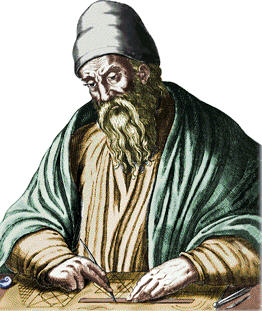
Euclid, sometimes called Euclid of Alexandria to distinguish him from Euclid of Megara, was a Greek mathematician, often referred to as the "founder of geometry" or the "father of geometry". He was active in Alexandria during the reign of Ptolemy I. His Elements is one of the most influential works in the history of mathematics, serving as the main textbook for teaching mathematics from the time of its publication until the late 19th or early 20th century. In the Elements, Euclid deduced the theorems of what is now called Euclidean geometry from a small set of axioms. Euclid also wrote works on perspective, conic sections, spherical geometry, number theory, and mathematical rigour.
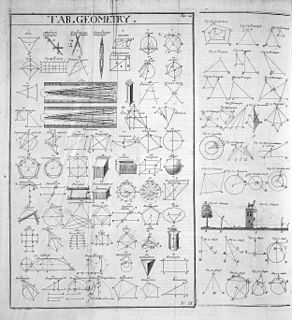
Geometry arose as the field of knowledge dealing with spatial relationships. Geometry was one of the two fields of pre-modern mathematics, the other being the study of numbers (arithmetic).
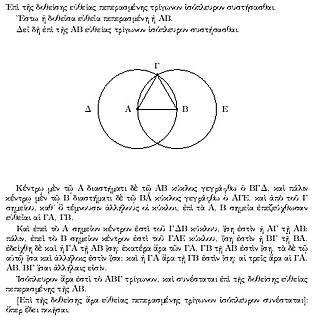
The area of study known as the history of mathematics is primarily an investigation into the origin of discoveries in mathematics and, to a lesser extent, an investigation into the mathematical methods and notation of the past. Before the modern age and the worldwide spread of knowledge, written examples of new mathematical developments have come to light only in a few locales. From 3000 BC the Mesopotamian states of Sumer, Akkad and Assyria, together with Ancient Egypt and Ebla began using arithmetic, algebra and geometry for purposes of taxation, commerce, trade and also in the field of astronomy and to formulate calendars and record time.

Mathematics includes the study of such topics as quantity, structure, space, and change.
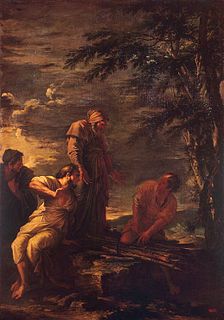
Protagoras was a pre-Socratic Greek philosopher. He is numbered as one of the sophists by Plato. In his dialogue Protagoras, Plato credits him with inventing the role of the professional sophist.

Christian Felix Klein was a German mathematician and mathematics educator, known for his work with group theory, complex analysis, non-Euclidean geometry, and on the associations between geometry and group theory. His 1872 Erlangen Program, classifying geometries by their basic symmetry groups, was an influential synthesis of much of the mathematics of the time.
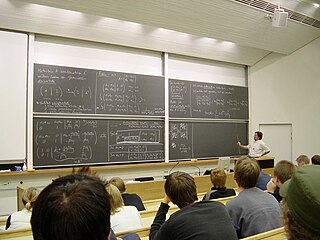
In contemporary education, mathematics education is the practice of teaching and learning mathematics, along with the associated scholarly research.
Pure mathematics is the study of mathematical concepts independently of any application outside mathematics. These concepts may originate in real-world concerns, and the results obtained may later turn out to be useful for practical applications, but the pure mathematicians are not primarily motivated by such applications. Instead, the appeal is attributed to the intellectual challenge and esthetic beauty of working out the logical consequences of basic principles.
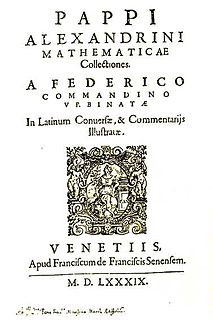
Pappus of Alexandria was one of the last great Greek mathematicians of Antiquity, known for his Synagoge (Συναγωγή) or Collection, and for Pappus's hexagon theorem in projective geometry. Nothing is known of his life, other than, that he had a son named Hermodorus, and was a teacher in Alexandria.
Anatoly Timofeevich Fomenko is a Soviet and Russian mathematician, professor at Moscow State University, well known as a topologist, and a member of the Russian Academy of Sciences. He is author of a pseudoscientific theory known as New Chronology. He is also a member of the Russian Academy of Natural Sciences (1991).

Hippasus of Metapontum, was a Pythagorean philosopher. Little is known about his life or his beliefs, but he is sometimes credited with the discovery of the existence of irrational numbers. The discovery of irrational numbers is said to have been shocking to the Pythagoreans, and Hippasus is supposed to have drowned at sea, apparently as a punishment from the gods for divulging this. However, the few ancient sources which describe this story either do not mention Hippasus by name or alternatively tell that Hippasus drowned because he revealed how to construct a dodecahedron inside a sphere. The discovery of irrationality is not specifically ascribed to Hippasus by any ancient writer. Some modern scholars though have suggested that he discovered the irrationality of √2, which is believed to have been discovered around the time that he lived.

Harold Davenport FRS was an English mathematician, known for his extensive work in number theory.
Mathematics encompasses a growing variety and depth of subjects over history, and comprehension requires a system to categorize and organize the many subjects into more general areas of mathematics. A number of different classification schemes have arisen, and though they share some similarities, there are differences due in part to the different purposes they serve. In addition, as mathematics continues to be developed, these classification schemes must change as well to account for newly created areas or newly discovered links between different areas. Classification is made more difficult by some subjects, often the most active, which straddle the boundary between different areas.

Greek mathematics refers to mathematics texts and advances written in Greek, developed from the 7th century BC to the 4th century AD around the shores of the Eastern Mediterranean. Greek mathematicians lived in cities spread over the entire Eastern Mediterranean from Italy to North Africa but were united by culture and language. Greek mathematics of the period following Alexander the Great is sometimes called Hellenistic mathematics. The word "mathematics" itself derives from the Ancient Greek: μάθημα, translit. máthēma Attic Greek: [má.tʰɛː.ma] Koine Greek: [ˈma.θi.ma], meaning "subject of instruction". The study of mathematics for its own sake and the use of generalized mathematical theories and proofs is the key difference between Greek mathematics and those of preceding civilizations.
The Academy was founded by Plato in c. 387 BC in Athens. Aristotle studied there for twenty years before founding his own school, the Lyceum. The Academy persisted throughout the Hellenistic period as a skeptical school, until coming to an end after the death of Philo of Larissa in 83 BC. The Platonic Academy was destroyed by the Roman dictator Sulla in 86 BC.
Euthydemus, written c. 384 BC, is a dialogue by Plato which satirizes what Plato presents as the logical fallacies of the Sophists. In it, Socrates describes to his friend Crito a visit he and various youths paid to two brothers, Euthydemus and Dionysodorus, both of whom were prominent Sophists from Chios and Thurii.

Geometry is a branch of mathematics concerned with questions of shape, size, relative position of figures, and the properties of space. A mathematician who works in the field of geometry is called a geometer.















